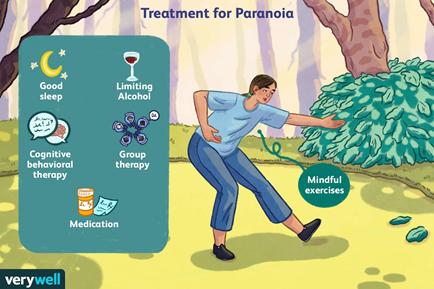Paranoia
At the turn of the nineteenth
century, the concept of paranoia emerged almost simultaneously in Germany and
France.. At the era of positivism and the belief of
psychiatric illnesses purely as consequences of organic disorders, theconcept changed
to psychopathologic findings. Paranoia is a chronic mental illness. Many people around the world suffer from this
disease.
Paranoia is an instinct or thought process believed to be severely
affected by anxiety or fear, often amounting to
delusion and irrationality. Paranoia is a pattern of thinking that
results in an irrational
feeling of losing confidence in people, believing in a threat,
such as feeling that there
are people watching you, or trying to harm you even
though there is no evidence
of that. It is not yet well known why some people have
personality disorders or
mental problems, but the cause can be a combination of
factors: genes, stress,
tension and Drugs can lead to paranoia.
-
The main types of paranoia disease:
1. Paranoid personality
disorder:
People with this disorder are
strange, suspicious, and distrustful of others without
logical evidence, and
monotonous personality disorder seems to be more common
in men than in women.
2. Delusions of greatness:
People who have problems with
shaping their personality, or who are
already harmed and they
imagine that they are great or powerful and
important
3. Delusional disorder:
Is a type of psychosis,
defined as a mental disorder that cannot differentiate
between truth and illusion.
4. Paranoid schizophrenia:
The most severe of these
types, a severe mental disorder that results in
hallucinations, delusions and
disorders of thinking and behavior, affecting the
performance of daily
functions, and requires lifelong treatment for schizophrenia.
-
Symptoms of paranoia:
Paranoia has many symptoms,
and the most common symptoms are:
. Suspicion of the actions of
others
. Not trusting others all the
time
. Easy to feel offended
. Inability to accept
intermediate solutions, forgiveness
. Isolation
. Inability to form social
relationships
. Extreme fear of giving
people any information about him, even close people
. Sometimes they imagine that
they are great or powerful.
-
Treatment of paranoia:
Treatment depends on the
cause, and on the severity of the condition, the treatment
includes two parts, and the
doctor may recommend one or both, which are:
1. medication treatment:
The doctor may recommend
different types of medications depending on the
condition, including:
. Antipsychotic
. anxiety medications
. Anti-depressants
2. Psychotherapy:
Psychotherapy aims to help
the patient cope, increase self-confidence and others,
express feelings in a
positive way, and develop communication skills.
And finally, here’s some tips to support paranoid people:




Nice post
ReplyDeleteso interesting
ReplyDeletevery nice post
ReplyDelete